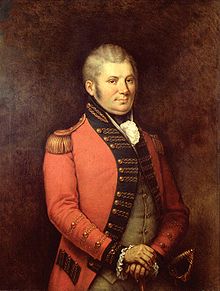John Graves Simcoe
| John Graves Simcoe | |
|---|---|

Portrait by George Theodore Berthon
|
|
| 1st Lieutenant Governor of Upper Canada | |
|
In office 1791–1796 |
|
| Monarch | George III |
| Governor General | Gen. Sir Guy Carleton, 1st Baron Dorchester |
| Premier | William Pitt the Younger |
| Preceded by | None |
| Succeeded by | Peter Russell |
| Personal details | |
| Born |
February 25, 1752 , Oundle, England |
| Died | October 26, 1806 (aged 54) Exeter, England |
| Spouse(s) | Elizabeth Posthuma Gwillim |
| Relations | Henry Walcot Simcoe (1823–1848) – son of Henry Addington, grandson of J.G. Simcoe Charlotte Simcoe (?– 1842) Katherine (1801–1861) Anne Simcoe (1804–?) Anne Eliza Marke Simcoe (1824–1869) – daughter of Henry Addington Paul Creed Guillim Simcoe (1835–1875) – son of Henry Addington Philip Francis Simcoe (1834–1885) son of Henry Addington John Kennaway Simcoe (1825–1891) |
| Children |
John Cornwall Simcoe (1798–1799) Francis Gwillim Simcoe (1791–1812) Eliza Simcoe Henry Addington Simcoe (1800–1868) Charlotte Henrietta Maria (?–1845) Caroline (?–1858) Katherine Simcoe (1793–1794) Sophia Jemima Simcoe (1789–1864)[better reference needed] |
| Parents | Captain John Simcoe Katherine Simcoe |
| Education |
Eton College, Merton College, Oxford |
| Occupation | Member of Parliament, author |
| Signature | |
| Military service | |
| Allegiance |
|
| Service/branch |
|
| Years of service | 1770–1806 |
| Rank | Lieutenant-General |
| Unit |
35th Regiment of Foot 40th Regiment of Foot |
| Commands |
Queen's Rangers 22nd Regiment of Foot Commander-in-Chief, India |
| Battles/wars | Haitian Revolution |
John Graves Simcoe (February 25, 1752 – October 26, 1806) was a British army general and the first Lieutenant Governor of Upper Canada from 1791 until 1796, in modern-day southern Ontario and the watersheds of Georgian Bay and Lake Superior. He founded York (now Toronto) and was instrumental in introducing institutions such as courts of law, trial by jury, English common law, freehold land tenure, and the abolition of slavery. His long-term goal was the development of Upper Canada (Ontario) as a model community built on aristocratic and conservative principles, designed to demonstrate the superiority of those principles to the Republicanism and democracy of the United States. His energetic efforts were only partially successful in establishing a local gentry, a thriving Church of England, and an anti-American coalition with the Indian tribes. That being said, he is seen by many Canadians—especially those in Southern Ontario—as a founding figure in Canadian history and as being divergent to the concepts of slavery. He is commemorated in Toronto with Simcoe Day.
John Graves Simcoe was the only surviving son of John (1710–1759) and Katherine Simcoe (d. 1767). His parents had four children (Percy drowned 1764; Paulet William and John William died as infants), but he was the only one to live past childhood. His father was a captain in the Royal Navy who commanded the 60-gun HMS Pembroke, with James Cook as his sailing master, during the 1758 siege of Louisbourg. His father died of pneumonia on 15 May 1759 on board his ship in the mouth of the Saint Lawrence River, a few months prior to the siege of Quebec. The family then moved to his mother's parental home in Exeter. His paternal grandparents were William and Mary (née Hutchinson) Simcoe.
...
Wikipedia
